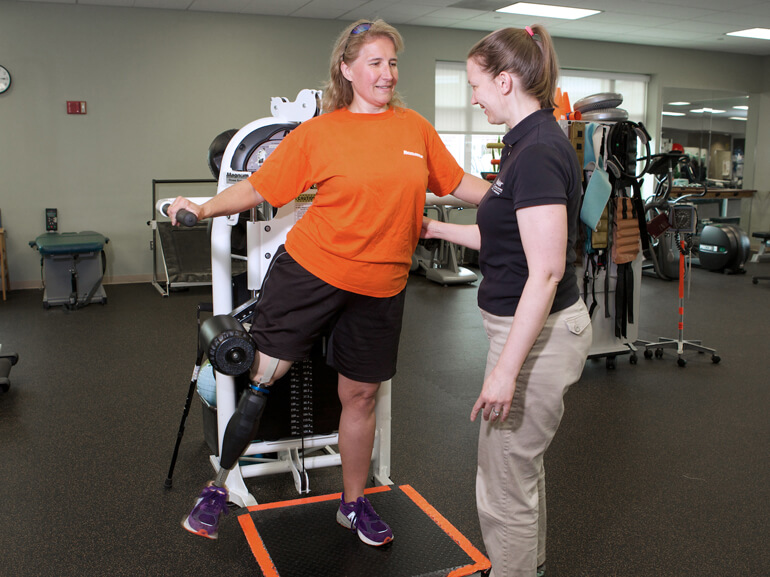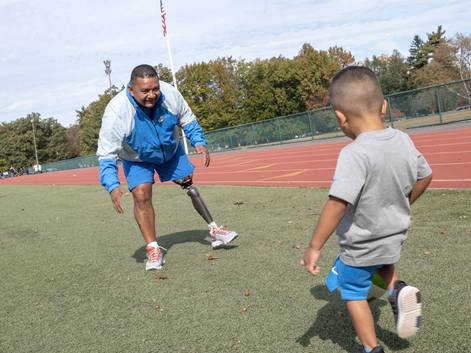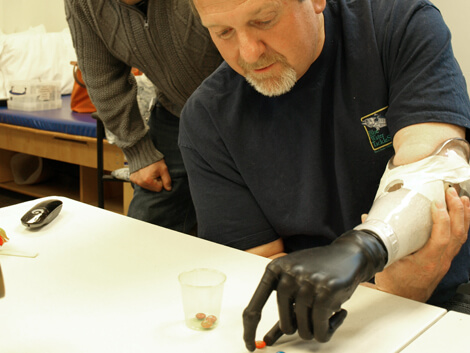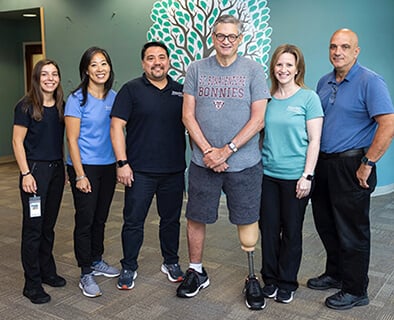Amputee Rehabilitation

The Kessler difference
From post-surgical care and prosthetic training to community reintegration and long-term follow up, Kessler Institute provides amputees with the individualized care that advances his/her physical recovery and helps overcome the many emotional, psychological and social challenges he/she faces.
-
Studies* show that individuals treated at an inpatient rehabilitation hospital – like Kessler Institute – have greater improvement, fewer complications and return home sooner than those treated at nursing facilities. Here you’ll benefit from a comprehensive, coordinated program of medical, nursing and therapy care, innovative prosthetic technologies and support to make the most of life ahead.
*Assessment of Patient Outcomes of Rehabilitative Care Provided in Inpatient Rehabilitation Facilities (IRFs) and After Discharge. Dobson DaVanzo & Associates, LLC. 2014.
-
At Kessler Institute, an experienced team of amputee rehabilitation specialists addresses the range of medical, physical, psychological and emotional issues you face.
This interdisciplinary team is led by a physiatrist, a physician board-certified in physical medicine and rehabilitation, and includes rehabilitation nurses; physical, occupational, and recreation therapists; prosthetists; psychologists; dietitians; pharmacists; case managers and other clinical and support staff, as needed.
-
Treatment is carefully integrated and tailored to your goals and progress. Our three-part program targets your pre-prosthetic, prosthetic and outpatient/reintegration needs by providing:
- Expert post-surgical wound care and residual limb management
- Therapies to enhance strength, flexibility, coordination and endurance
- Management of pain and/or phantom limb pain
- Custom design, fitting and manufacture of a prosthesis to meet your lifestyle needs
- Training on the use and maintenance your prosthesis
- Psychology services to help you overcome any emotional, social or behavioral issues
- Extensive education, peer mentoring and support groups for both patients and families
-
Kessler’s board certified prosthetists combine the latest science and technologies to customize the design, fit and manufacture of a prosthesis that will match your physical and lifestyle needs. This includes:
- Computer-Aided Design (CAD) to improve socket fit and performance
- Materials that decrease prosthetic weight and enhance strength
- Microprocessor-controlled knee and ankle joints
- Upgrades in the torsion and shock absorption for feet and ankles
- Robotic technologies
-
From inpatient to outpatient, Kessler Institute offers lifelong treatment and support to patients.
One special feature is our Amputee Clinic. Here, a team of clinicians – including a physiatrist, prosthetist, physical therapist and podorthotist – evaluate and monitor patient progress. They address problems or concerns, adjust current devices, introduce advances in prosthetic design and offer guidance to meet changing lifestyle needs.
-
Patients with limb loss who choose Kessler for their rehabilitation have greater improvement during their stay and a higher level of independence upon discharge than similar patients treated at other rehabilitation hospitals, based on national benchmarks*.
*Source: eRehabData.com

Your progress. Our program.
It’s important to remember that recovery takes time. Each patient is different and your stay with us will depend on the extent of your surgery, other medical issues or personal factors and the progress you make each day.
-
For more than 75 years, Kessler Institute has pioneered the field of medical rehabilitation. Today, we continue to provide advanced care and innovative treatment. That includes a combination of hands-on therapies and proven technologies to help you regain strength, restore skills and mobility and rebuild your life.
-
Kessler’s Peer Visitor Program, developed in cooperation with the Amputee Coalition of America, brings together patients and families with specially trained and certified amputee volunteers for peer-to-peer mentoring. This program is in addition to Kessler’s monthly support groups, which give amputees and their families the opportunity to share information, discuss common problems and learn from the experiences of others.
-
Individuals with above or below knee amputation may need to use a wheelchair. Proper wheelchair fit is essential. Kessler’s physical and/or occupational therapists, who are also certified assistive technology professionals and/or seating and mobility specialists, will evaluate your physical and lifestyle needs and use pressure mapping and other tools to find the best options for you.
-
The ability to perform daily activities at home, work, school or in the community is critical to your independence. Your therapy team may introduce a variety of electronic aids and other assistive technologies, such as advanced environmental controls, voice-activated systems, or other adaptive equipment that can help you manage everyday tasks.
-
Preparing you and your family for life ahead is one of our primary goals. We provide extensive education to help you understand the limb loss, along with the strategies, resources and training to help you adjust. We also offer patient and family support groups where you’ll be able to discuss common concerns, share information, gain greater insight and get encouragement.
-
To help reinforce your skills and restore your spirit, Kessler’s specially trained Canine Companions for Independence* may be part of your therapy program. Several Kessler therapists work with these remarkable dogs to engage patients in a wide range of activities that support the rehabilitation process.
*Not available at Kessler-Marlton
-
The ability to drive allows amputees to resume a more independent lifestyle. Kessler Institute’s certified driver rehabilitation specialists offer the evaluation and training to help appropriate individuals drive safely. They will also discuss any modifications and/or adaptations that may need to be made to your car or van and provide guidance on updating your license and taking the required road test.

